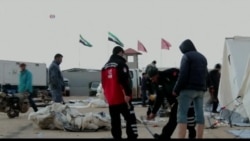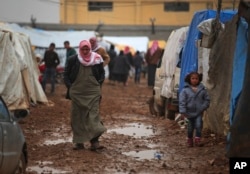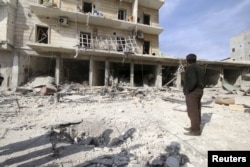The United Nations warned Tuesday that if pro-government forces in Syria succeed in encircling the strategic city of Aleppo then up to 300,000 people could be cut off from humanitarian aid.
In an assessment of the situation in Aleppo, the U.N. said the Aleppo offensive has already cut rebel supply lines between the eastern part of the city and the Bab al-Salam crossing on the Turkish border.
Further advances into the city could send another 100,000 to 150,000 civilians fleeing Aleppo.
The World Food Program said Tuesday it is distributing urgently needed meals to 21,000 people who fled Aleppo to A'zaz, just south of the Turkish border.
Volatile, fluid situation
Jakob Kern, WFP director in Syria, called the situation in Aleppo "quite volatile and fluid."
Pro-government forces have pounded their way toward Aleppo during the past week in their effort to crush rebels who have been fighting President Bashar al-Assad's regime for more than five years.
“If that happens, the rebel momentum will be gone,” said Omar Lamrani, a military analyst for Stratfor, geopolitical intelligence firm based out of Texas. “If Aleppo were to fall, it would highlight how dire the situation is for the rebels throughout the country.”
Russian warplanes have been relentlessly bombing northern Syria for days, forcing U.S.-backed and other rebel forces to take shelter in tunnels and blast craters.
One young rebel fighter told VOA that morale has dropped to rock bottom as anti-Assad fighters feel the West has abandoned them.
“I have spoken with the ambassadors and their staffs of the U.S., Britain and France, and asked them, ‘What will you do other than make statement?’ ” said Zakaria Malahefji, political officer to the 3,000-strong Fastaqim Kama Umirt brigade.
US game plan
With government troops backed by Russian air power and Iranian-backed ground forces seizing the north of the city and threatening to move south to link up with government-held parts of the city, it does not appear that Washington can do much.
“The U.S. has its game plan, and that is the negotiating table,” Lamrani said.
But with Syrian forces gaining ground, the attraction for the Syrian government of a political solution over a military one appears to be fading fast.
Talks in Geneva for a political solution to Syria’s conflict stalled last week after just two days on differences between Syria and the opposition on the priority of humanitarian issues.
The U.S. State Department said Russia was also partly to blame.
"It is difficult in the extreme to see how strikes against civilian targets contribute in any way to the peace process now being explored," spokesman John Kirby said.
Russian investment
Although the Russians have lost men and money, Lamrani said it appeared that their investment was paying off, to the detriment of the Syrian opposition and its U.S.-led coalition backers.
“They are highlighting they are a power in the Middle East,” he said. The Russians and Iranians are also pushing to create a situation whereby the “only really viable choices are the Syrian government or Islamic State – and IS is a non-option.”
“By removing the rebels from the equation, then essentially it is game over,” Lamrani said.
But the conflict could also get more complicated and more drawn out.
Turkey, Saudi Arabia and Qatar, unwilling to cede such influence to Syria and its allies, might decide that one way to force everyone back to the negotiating table is to raise the cost of the military campaign by bolstering the rebels with more money and bigger and deadlier weapons.
“They want to maintain a stake in the conflict,” Lamrani said. “They still want the U.S. to stay close and give them cover against Russia to keep Russian ambitions at bay.”
VOA’s Jamie Dettmer contributed to this report from the Turkish-Syrian border, Chris Hannas contributed from Washington.









